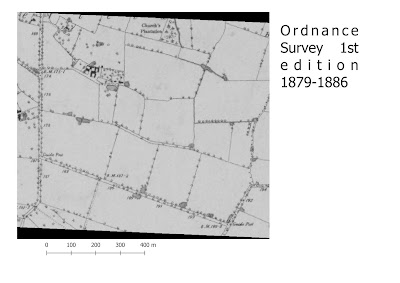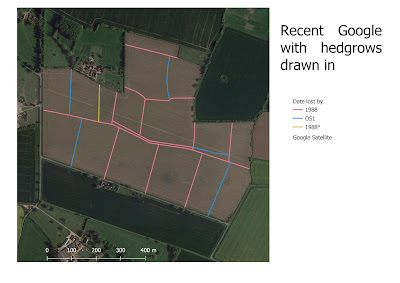[The following short was written for the Friends of Lowestoft Library's literature festival competition 2016. The prize on offer was a book token of uncertain value (anyway, I was going to decline in the event that I won - long story). The brief was to write a story under 1500 words on the theme of "To be or not to be..." I called it "The Undiscovered Country" (see what I did there) and for extra brownie points, I set it in an anonymous seaside town that could very well have been Lowestoft itself. Caveat 1: the story is written in present tense, and gawd, I hate present tense (very hard to pull off; lazy writer's quick steroid injection to beef up naff work). For some reason I was feeling "present" for this one. Caveat 2: the story was banged out and not edited (deadline was short). The bounders extended the deadline after I'd rushed to get it in. So there are undoubtedly bits that would benefit from a bit of emery cloth.
Either way, the judges were not impressed! Enjoy, or not, as the case may be.]
===
The Undiscovered Country
At about three-thirty, unable to sleep, I finally go to confront him.
What do I have to fear now? Nothing. But I stand at the door in the
dim corridor with my fist raised to knock as if time has frozen.
The sounds in room 121 go on. There is more than a door between me
and the sounds: there is a world.
I stare at the numbers on the door and do not knock. Instead, at
three-thirty on a winter morning, I first return to my room and pace
like an impotent; then I go outside. In the hall at the foot of the
carpeted stairs, the lone overhead light is buzzing on and off.
To be on, or to be off.
To live on.
To die.
To fight on, to cling to the ever-shrinking handfuls of light between
the enveloping arms of darkness. Why does it buzz on futilely? A moth
soughs and flutters against a window, trapped in sight of a goal it
can never reach.
At the bottom of the stairs the bar is empty, silent. The only light,
shining through the glass door, is the garish kaleidoscopic
flickering of a gambling machine. I think of the empty chairs and the
stained tables. I remember the barman, pouring my order the moment I
walked into the bar for the second time. I remember the bar's carpet:
matted into a beery, tacky, colourless film.
I turn away to the door that leads outside, into the bitterness of a
February night. The strip is deserted, still lit by hopeful orange
lights. The waves are unseen, their sound a dead mechanical rumble,
the murmur of an eternal machine. In this machine the pointless waves
forever throw themselves against the land and fall back, spent,
beaten. Then they gather themselves and try again and again fail.
There are lights out there on the oil-black sea, buoys, rigs,
windmills, a passing vessel.
A door behind me slams open and closed.
I look reflexively.
The man has come from room 121. He looks at me with a swagger, a
challenge: what am I going to do about it?
The answer: nothing. It's an answer I always give.
He drives off, back to a world he can pretend does not impinge upon
this time, this place. Until he grows a baser fruit that needs
plucking.
The door opens again before the echoes of the departing car have
gone. The woman is black-eyed, unbeaten; under the streetlights her
skin is translucent, like waxed paper wrapping a bruise. She is aged,
but not old; aetiolated, starved, wretched – but upright, unafraid,
level. She has sung her song until the words have become meaningless.
I shudder. A momentary instinctive revulsion rises up in me, as if
the ill-use, the dark times in dirty square rooms, the fond grip of
merciless laughter, might exist as a real thing, a scum, a miasma, a
crumb of dirt, a contagion that might rub off. It makes my
involuntary first step a backwards one, not a forwards one.
“Sorry about the noise,” she says, in an even tone. She meets my
eye for a second.
“I was awake anyway.”
“So you heard everything,” she says, and turns away to look up
and down the deserted seafront. “Sorry about that.”
“No. It wasn't that bad,” I say. I think of the way I stood in
front of her door but did not knock.
She looks at me again, measuring me. “What are you doing in this
hellhole?”
“Holiday,” I say. The word sounds hollow. Pleased to meet you,
and by the way, I'm a liar.
“No-one comes here for a holiday. Not at this Godforsaken time of
year.” She says this without rebuke.
“I was just thinking about the waves,” I blurt. “About how
pointless they are, doing the same thing over and over again, failing
and trying, trying and failing.”
“But each wave is new. Each only exists for a moment. They do not
fail; their lives end in defeat, as all lives do. But they throw
themselves into the fight without regret. Their defeat is their
victory. Their pride, their glory; their magnificence.”
I don't know what to say to that. I remember something long
forgotten: an old vagrant, sitting on the station steps in a puddle
of his own making, reciting Shakespeare. He looked up as I approached
and addressed a few lines to me:
“...Who would fardels bear
To grunt and sweat under a weary life,
But that the dread of something after death,
The undiscovered country, from whose bourn
No traveller returns, puzzles the will,
And makes us rather bear those ills we have
Than fly to others that we know not of?”
I walked by him, stepping over the tiny rivulet. I said nothing. I
did nothing. I gave my usual answer. The old man carried on his
speech until I could hear him no more. The Shakespearean philosopher
was right to fear death; but for the materialist there is only
permanent nothing. The old vagrant Hamlet had a beginning, and must
after these intervening years have had an end. As do we all.
“I can't stand too close to you,” the woman says, and begins to
walk away. “It's business.”
Whatever chance I had, I missed it. I look up and down the strip; it
is deserted. Even the paired red lights of the departing car have
vanished from view. We two are the only souls left. She is a lost
soul, but so am I. One lost soul cannot guide another. But they draw
one another, like flotsam rolled together in a restless sea, soon
parted by chance eddies.
“You could leave,” I call out. “Get on a bus and go.”
She looks back, already far away. “So could you.”
I watch as she moves away. The February wind is bitingly cold.
After a time, shivering, I go inside.
*
When I awake, it is dark again. The days are devilishly short at this
time of year, the nights nightmarishly long.
The whisky and the pills stand untouched on the counter, just as they
have done these past fourteen days.
I am not ready, and may never be ready to live again. But I am not
yet ready to die.
*
I stand outside her door, and this time I knock. I cannot just leave.
We shared only a few short moments, a few words. I don't know her
name. But I cannot just leave. For a long time I think she isn't
coming, but finally the door opens.
“What do you want?” she asks coldly.
“I'm going back,” I say. Now, suddenly, I wonder why she should
be interested to hear that.
“Good for you,” she says, but she doesn't mean it. She doesn't
care either way.
I want to tell her that I watched the flowers wither. I want to say
that I hid from the knocking at the door, and in the end the knocking
stopped. But I do not. I cannot. Instead, hopelessly, I hand her the
whisky and the pills. “One at a time,” I say, in case she sees an
implication in my gift that isn't there.
A smile. Not at the gift, but at the caveat. “We're all just
crossing the river,” she says, and takes both gifts, “one stone
at a time.”
“I'll come back,” I say.
“Why?” she asks.
I want to explain that lost souls cannot save one another; they need
an anchor, a grounding, something to pull against to haul themselves
to shore. But I can't find the words. Instead, I say: “To save
you.”
She looks downcast for a moment. Then she shapes a bitter smile.
“Men,” she says, “are all the same.”
She closes the door, quietly but firmly, in my face.
THE END







